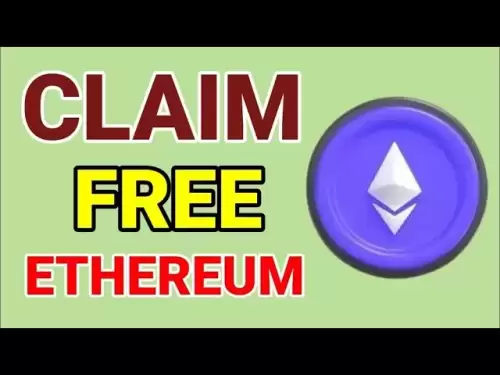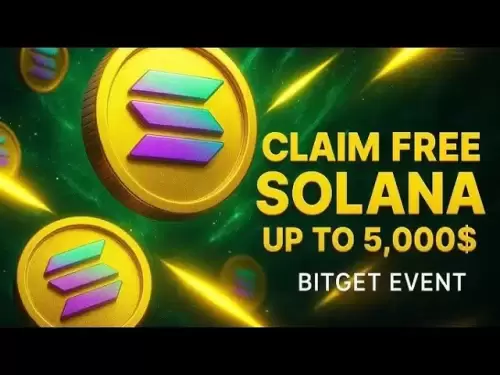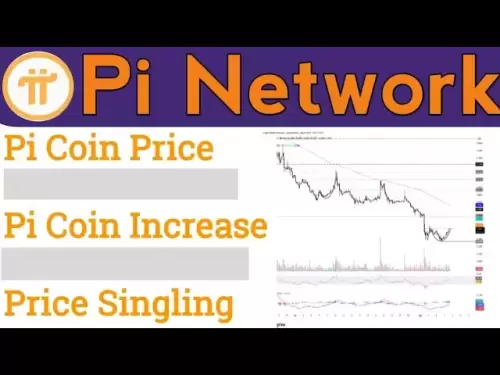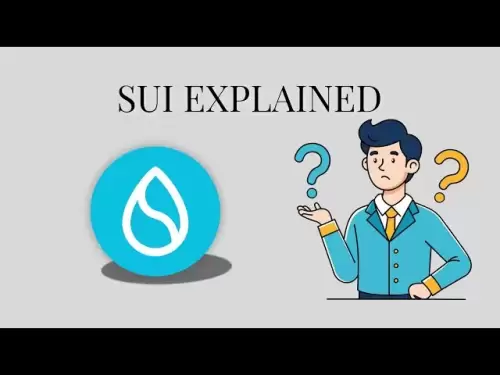-
 Bitcoin
Bitcoin $118300
1.01% -
 Ethereum
Ethereum $4215
0.69% -
 XRP
XRP $3.198
-3.83% -
 Tether USDt
Tether USDt $1.000
-0.01% -
 BNB
BNB $803.4
-0.53% -
 Solana
Solana $180.3
-0.67% -
 USDC
USDC $0.9998
-0.01% -
 Dogecoin
Dogecoin $0.2334
-1.49% -
 TRON
TRON $0.3394
0.86% -
 Cardano
Cardano $0.7980
-1.45% -
 Chainlink
Chainlink $22.19
6.65% -
 Hyperliquid
Hyperliquid $43.41
0.13% -
 Stellar
Stellar $0.4407
-3.13% -
 Sui
Sui $3.843
-2.24% -
 Bitcoin Cash
Bitcoin Cash $564.7
-3.74% -
 Hedera
Hedera $0.2588
-3.41% -
 Ethena USDe
Ethena USDe $1.001
0.00% -
 Avalanche
Avalanche $23.64
-3.37% -
 Litecoin
Litecoin $120.0
-4.01% -
 Toncoin
Toncoin $3.342
-1.11% -
 UNUS SED LEO
UNUS SED LEO $9.038
0.60% -
 Shiba Inu
Shiba Inu $0.00001347
-0.81% -
 Uniswap
Uniswap $10.69
-4.58% -
 Polkadot
Polkadot $4.034
-1.30% -
 Dai
Dai $1.000
0.01% -
 Bitget Token
Bitget Token $4.472
-1.52% -
 Cronos
Cronos $0.1571
-3.04% -
 Pepe
Pepe $0.00001207
-2.21% -
 Monero
Monero $273.8
-3.19% -
 Ethena
Ethena $0.7520
2.75%
What is the governance mechanism of Sol coin?
Solana's governance uses a delegated proof-of-stake model, letting SOL holders directly vote or delegate to validators on proposals via a dedicated platform, requiring a quorum for approval. The system is designed to evolve through community feedback.
Mar 04, 2025 at 06:06 pm
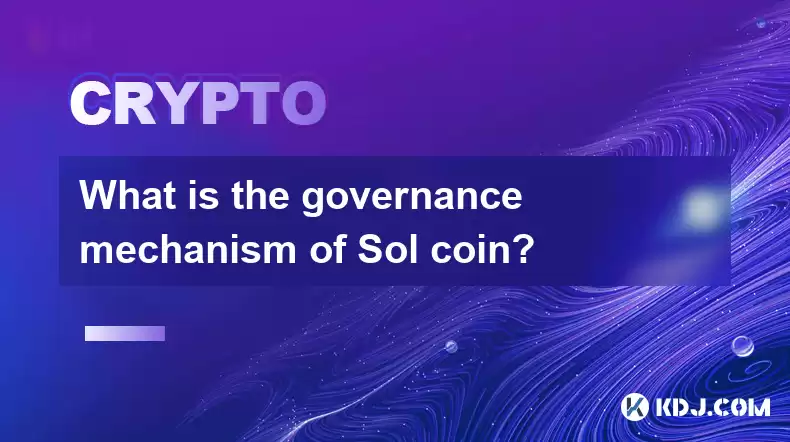
Key Points:
- Solana's governance mechanism is a decentralized system designed to allow token holders to participate in shaping the future of the network.
- It utilizes a delegated proof-of-stake (DPoS) model, distributing governance power among validators and delegators.
- Proposals are submitted and voted upon through a dedicated governance platform, requiring a quorum for successful passage.
- Token holders can directly participate or delegate their voting power to validators they trust.
- The system is designed to evolve and adapt over time based on community feedback and participation.
What is the governance mechanism of Sol coin?
Solana's governance mechanism is a crucial aspect of its ecosystem, determining how the network evolves and adapts. Unlike some cryptocurrencies with centralized control, Solana aims for a decentralized, community-driven approach. This is achieved through a sophisticated system that allows SOL token holders to participate in shaping the future of the network. The primary method is through a delegated proof-of-stake (DPoS) model.
Understanding Solana's Delegated Proof-of-Stake (DPoS)
Solana’s governance isn't directly democratic; instead, it's a delegated system. This means SOL token holders don't individually vote on every proposal. Instead, they delegate their voting power to validators. Validators are individuals or entities that actively participate in securing the network by validating transactions. By staking their SOL, they earn rewards and the right to vote on proposals. This approach makes the governance process more efficient and less susceptible to manipulation by individual token holders with minimal stakes.
How does the voting process work?
The Solana governance process unfolds through a dedicated platform where proposals are submitted and voted upon. Proposals can range from minor protocol updates to significant changes in network parameters. To submit a proposal, one needs to meet certain criteria, such as holding a minimum amount of SOL. After submission, the proposal undergoes a period of community discussion and review before being put to a vote. A minimum quorum of participating SOL is required for a proposal to be considered valid.
Participating in Solana Governance: Two Primary Methods
There are two primary ways SOL holders can participate in governance:
- Direct Participation: If a user holds a significant amount of SOL, they can directly participate in voting on proposals. This requires actively monitoring the governance platform and casting votes.
- Delegation: Most SOL holders choose to delegate their voting rights to validators. They select validators they trust to represent their interests and vote on proposals accordingly. This is a more passive approach, but it still allows token holders to influence the direction of the Solana network.
The Role of Validators in Governance
Validators play a pivotal role in Solana's governance. They are responsible for validating transactions and participating in the voting process. Their reputation and performance influence the amount of SOL delegated to them. Validators with a strong track record and high uptime tend to attract more delegations. This creates a competitive environment, encouraging validators to act in the best interests of the network and their delegators. The system also incentivizes validators to engage in responsible governance decisions.
Understanding Quorums and Voting Thresholds
For a proposal to pass, it must meet certain thresholds. A quorum is the minimum percentage of staked SOL that must participate in the vote for the proposal to be considered valid. If the quorum isn't met, the proposal fails regardless of the voting outcome. Additionally, proposals usually need to surpass a certain percentage of "yes" votes to be approved. These thresholds are designed to prevent proposals from being passed by a small, potentially biased group of voters. The specific percentages for quorums and voting thresholds can vary depending on the nature of the proposal and may be subject to future adjustments via governance proposals themselves.
The Evolution of Solana's Governance
Solana's governance mechanism isn't static. The system is designed to adapt and improve over time based on community feedback and participation. This iterative approach allows for adjustments to be made to address any shortcomings or inefficiencies discovered in the system. The ongoing refinement of the governance process reflects Solana's commitment to a truly decentralized and community-driven approach. Future updates might involve changes to voting mechanics, proposal submission processes, or even the underlying governance tokenomics. Continuous monitoring and adaptation are crucial for maintaining a healthy and responsive governance system.
The Importance of Community Engagement
Active community engagement is essential for the success of Solana's governance mechanism. Token holders are encouraged to participate in discussions, review proposals, and engage with validators. This ensures that the decisions made reflect the collective will of the community. Understanding the governance process empowers token holders to make informed decisions about how to participate and influence the future direction of the Solana network. A well-informed and actively involved community is crucial for a healthy and successful decentralized network.
Common Questions:
Q: How many SOL do I need to participate in governance? A: While there isn't a strict minimum to delegate, holding enough SOL to earn meaningful staking rewards is recommended. Direct participation usually requires a considerably larger stake to have a substantial impact on voting outcomes.
Q: What happens if a validator acts maliciously? A: Solana's system incorporates mechanisms to penalize malicious validators. This could involve slashing their staked SOL or removing them from the validator set. Delegators should carefully research validators before delegating their SOL.
Q: Can the governance mechanism be changed? A: Yes, the governance mechanism itself can be modified through the governance process. Proposals to amend the rules or parameters of the governance system are possible, ensuring the system's adaptability and resilience.
Q: How often are governance proposals made? A: The frequency of proposals varies. Some periods may see many proposals, while others may have fewer. The community’s activity and the need for network updates influence the frequency.
Q: Where can I find more information about Solana governance? A: The official Solana website and its dedicated governance platform are the best resources for the most up-to-date information and details on ongoing proposals. Active participation in community forums and discussions is also recommended.
Disclaimer:info@kdj.com
The information provided is not trading advice. kdj.com does not assume any responsibility for any investments made based on the information provided in this article. Cryptocurrencies are highly volatile and it is highly recommended that you invest with caution after thorough research!
If you believe that the content used on this website infringes your copyright, please contact us immediately (info@kdj.com) and we will delete it promptly.
- Dogwifhat's Comeback: Solana Meme Coin Mania and Beyond!
- 2025-08-10 18:30:15
- Shiba Inu Price Drop Alert: Can Google AI Predict the Future?
- 2025-08-10 18:30:15
- NEAR Protocol Rebound: Eyes on $4.63 as Bullish Momentum Builds
- 2025-08-10 17:30:13
- Bitcoin Cash Halving: Will the Price Fall or Fly?
- 2025-08-10 17:30:13
- Uniswap (UNI) Under Bearish Pressure: A Technical Analysis Deep Dive
- 2025-08-10 17:30:15
- DOT Price on the Rise: Polkadot's Bullish Momentum Heats Up!
- 2025-08-10 17:30:15
Related knowledge

How to purchase Aragon (ANT)?
Aug 09,2025 at 11:56pm
Understanding Aragon (ANT) and Its PurposeAragon (ANT) is a decentralized governance token that powers the Aragon Network, a platform built on the Eth...

What is the most secure way to buy Ocean Protocol (OCEAN)?
Aug 10,2025 at 01:01pm
Understanding Ocean Protocol (OCEAN) and Its EcosystemOcean Protocol (OCEAN) is a decentralized data exchange platform built on blockchain technology,...

Where can I buy UMA (UMA)?
Aug 07,2025 at 06:42pm
Understanding UMA and Its Role in Decentralized FinanceUMA (Universal Market Access) is an Ethereum-based decentralized finance (DeFi) protocol design...

How to buy Storj (STORJ) tokens?
Aug 09,2025 at 07:28am
Understanding Storj (STORJ) and Its Role in Decentralized StorageStorj is a decentralized cloud storage platform that leverages blockchain technology ...

What is the best app to buy Nano (NANO)?
Aug 09,2025 at 03:35am
Understanding Nano (NANO) and Its Unique FeaturesNano is a feeless, instant cryptocurrency designed for fast peer-to-peer transactions. Unlike many ot...

Where can I purchase Siacoin (SC)?
Aug 08,2025 at 11:14am
Understanding Siacoin (SC) and Its Role in the Sia NetworkSiacoin (SC) is the native cryptocurrency of the Sia decentralized cloud storage platform, a...

How to purchase Aragon (ANT)?
Aug 09,2025 at 11:56pm
Understanding Aragon (ANT) and Its PurposeAragon (ANT) is a decentralized governance token that powers the Aragon Network, a platform built on the Eth...

What is the most secure way to buy Ocean Protocol (OCEAN)?
Aug 10,2025 at 01:01pm
Understanding Ocean Protocol (OCEAN) and Its EcosystemOcean Protocol (OCEAN) is a decentralized data exchange platform built on blockchain technology,...

Where can I buy UMA (UMA)?
Aug 07,2025 at 06:42pm
Understanding UMA and Its Role in Decentralized FinanceUMA (Universal Market Access) is an Ethereum-based decentralized finance (DeFi) protocol design...

How to buy Storj (STORJ) tokens?
Aug 09,2025 at 07:28am
Understanding Storj (STORJ) and Its Role in Decentralized StorageStorj is a decentralized cloud storage platform that leverages blockchain technology ...

What is the best app to buy Nano (NANO)?
Aug 09,2025 at 03:35am
Understanding Nano (NANO) and Its Unique FeaturesNano is a feeless, instant cryptocurrency designed for fast peer-to-peer transactions. Unlike many ot...

Where can I purchase Siacoin (SC)?
Aug 08,2025 at 11:14am
Understanding Siacoin (SC) and Its Role in the Sia NetworkSiacoin (SC) is the native cryptocurrency of the Sia decentralized cloud storage platform, a...
See all articles





















